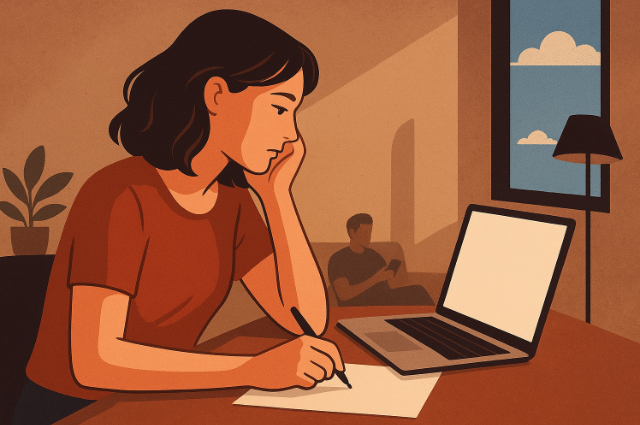
The first time I asked myself this question, I was at a desk in my rented one-room apartment, surrounded by mugs that hadn’t been washed in days. The cursor blinked at me on a blank Word document. I had promised an editor a piece ten days ago, and the deadline had passed unnoticed.
My phone lit up with a message, “Hey, Season 2 is out. 9 pm? :)”
I stared at the screen for a few seconds, then shut the laptop. Dinner and the series sounded easier than wrestling with the shame of that blank page.
It wasn’t a dramatic moment. Nothing in our relationship really was. There were no ultimatums, no “it’s me or your work” conversations. If anything, my partner always cheered me on. “Send that pitch,” “You’re really good at this,” “You’ll make it.”
And yet, slowly, gently, the hustle I once prided myself on dissolved into evenings of takeaway boxes, shows we’d half-watch before falling asleep, and mornings where the snooze button was pressed.
There was a time I believed life was supposed to look like an upward graph: school, college, internship, career. A clean line of ambition. I remember my final year in university, staying late in the library, living on instant coffee, filling entire notebooks with article ideas. I believed in momentum. I believed I could only afford to move forward. Then, somewhere in between a job application and an unfinished draft, I fell in love.
And love, for me, didn’t come as a hurricane. It came as a blanket. Warm, steady, safe. The kind of comfort that doesn’t pull you off track, it just makes the track feel less urgent.
The shift was so gradual I didn’t even notice it at first. Until one afternoon, sitting across from a college friend at Café Coffee Day, I realised the distance. She was telling me about her promotion, her manager trusting her with bigger campaigns, and her plans to switch to a multinational next year. She spoke with the sharpness of someone who had stayed in motion.
I smiled, nodded, and congratulated her. But something inside me ached. Because I couldn’t really remember the last time I had spoken about my own plans with that kind of zeal.
That week, I opened my notebook, the same one I once carried literally everywhere. The pages stopped somewhere in the middle, half-baked ideas, a few abandoned sentences, then nothing. The dates in the top corner sort of mocked me. Months had passed. And when I tried to write, my head felt heavy, like I’d forgotten how to stretch those muscles.
I didn’t resent my partner. How could I? He wasn’t holding me back, wasn’t telling me to stop. If anything, he wanted me to keep going. But love has a way of filling the room so completely that you forget the world outside exists. And I had let it.
I had chosen dinners and series and aimless walks over deadlines, 5 am alarms, and discomfort. It wasn’t his fault. Love doesn’t take your time; you give it.
Being in your mid-twenties is a weird limbo. You’re no longer figuring out what you want; you know it. But you’re still figuring out how to get it. The world tells you a “good” partner makes you grow. That’s only half the truth. A partner can support you, but they cannot drag your dreams forward. They can cheer, but they cannot carry.
For me, the turning point came quietly. I was scrolling on my phone one morning, half-asleep, when I saw a job posting. It was for a role I had dreamed of two years earlier, one I’d even drafted an application for but never sent. The deadline was that day.
I didn’t apply. Not because I didn’t want to, but because I didn’t have the portfolio to back it up anymore. I had let it all go stale. That moment stung more than any missed deadline or late submission. I realised I wasn’t just moving slowly, I had stopped moving.
The thing about waiting for the “right time” is that it never arrives. There’s no season when love will become lighter or work will feel easier. You only get the hours you already have, and you decide what to do with them.
I started again, hesitantly at first. I woke up one morning and wrote three paragraphs, bad paragraphs, the kind that don’t flow and don’t make sense, but they were mine. I pitched a small story to an editor who had stopped hearing from me. She said yes. I started reading again, underlining lines like I used to. Slowly, the rhythm returned.
My partner noticed the change, asked me why I’d started staying up late again. When I told him I was writing, he just smiled and said, “Finally.”
It struck me, the relationship was never the anchor. I was. I had mistaken comfort for progress. I had mistaken companionship for fulfilment.
Love doesn’t have to shrink you. It doesn’t have to silence the restless part of you that wants to build, to rise, to stretch. A relationship can be a hammock, but can it also be a launchpad? Oh, yes. The difference is whether you climb into rest indefinitely or stand on it to leap further.
Tonight, I’m back at my desk. The cursor still blinks, but the page is no longer empty. The room is the same, warm light, soft music, my partner scrolling on his phone nearby. But the windows are open now. The air outside rushes in. It carries ambition, hunger. It carries momentum.
I am still in love. And I am still running.
Only this time, I set the pace.
